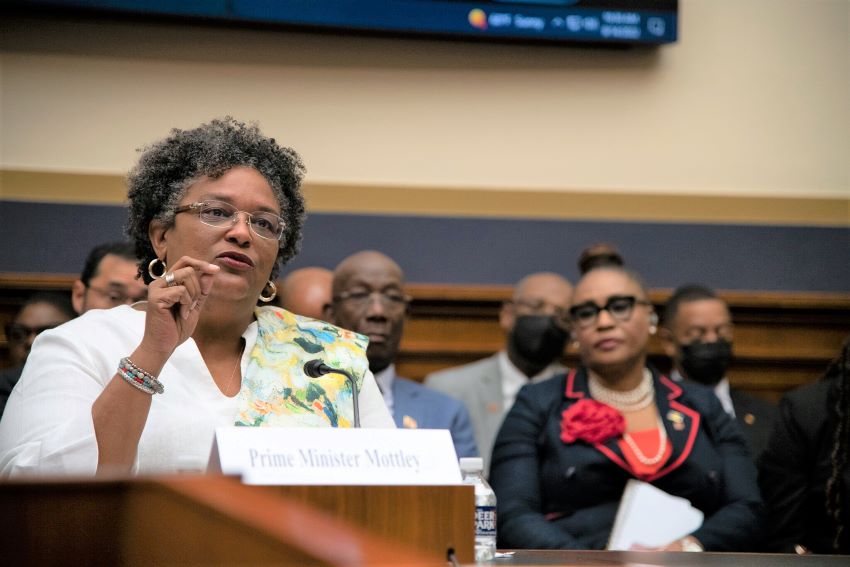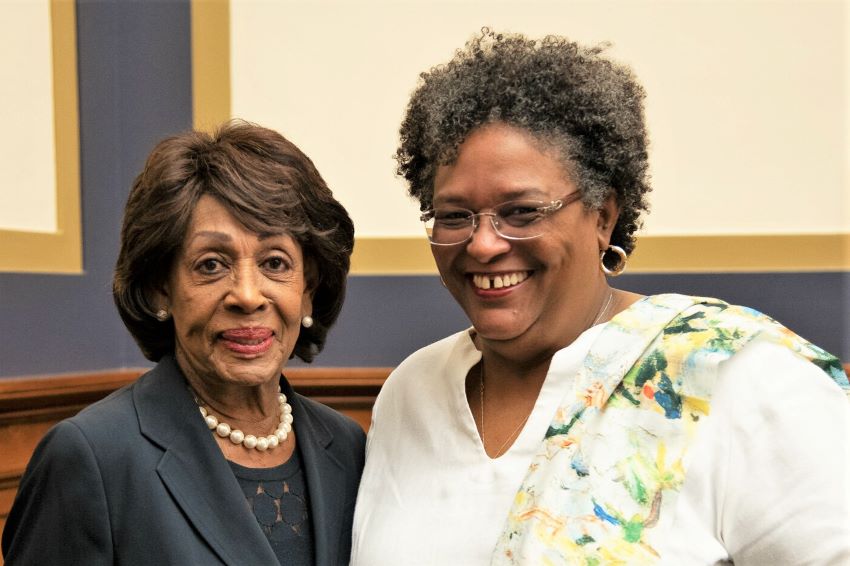
Prime Minister Mia Amor Mottley has informed a specially convened panel on de-risking that the blacklisting by some financial regulators has resulted in a loss of more than 30 per cent of correspondent banking relationships in the Caribbean.
The Prime Minister insisted that the listing process, whether through the Financial Action Task Force or the Organisation for Economic Cooperation and Development, meant that they have “made a judgement that we are simply too small as I’ve just told you, in order to get involved because the enhanced due diligence means increased costs of regulation and increased cost of compliance. And rather than do business with us, they say thank you, but no, thank you”.
Ms. Mottley was giving testimony yesterday during the full sitting of the United States’ House of Committees’ hybrid hearing entitled: When Banks Leave: The Impacts of De-Risking on the Caribbean and Strategies for Ensuring Financial Access in Washington.
The session was chaired by Chairman of the United States Financial Services Committee, Congresswoman Maxine Waters, and is a follow-up to a meeting held with CARICOM and some members of the Financial Services Committee convened here in April.
The Prime Minister contended that other organisations have used alternative mechanisms as their benchmark that have created a situation where “the very thing that you set out to achieve, which is the avoidance of terrorism financing and the avoidance of money laundering on which we are all agreed, is likely to happen because you’re driving people underground”.
“There is no benefit in driving our citizens underground, or making our countries uncompetitive such that our economies are at risk of becoming underdeveloped or failed states. And we have now to determine whether this is capable of being a continued acceptable course of action. We have been making noise for nearly a decade. And we want to thank this committee for hearing us today, because that noise cannot continue,” she stressed.
Ms. Mottley continued: “Ironically, with the technological developments that are taking place, and as recent as the issuance of the digital Yuan, on which the Economist Magazine wrote a column last week, there are options becoming available to countries to opt out of the SWIFT system, and to find other ways of being able to transmit money to their citizens, for us in this region. It is not yet here but given long enough nature abhors a vacuum, and we will find a way.”
The Prime Minister argued that countries and its citizens should have the right to open a bank account and access to affordable banking services to permit trade and the flow of remittances since the region’s economies are enabled to function on their own.
“Our economies cannot function on their own. We do not make enough clothes; we do not produce our own food; we do not produce our own equipment. Therefore, unless we are able to trade with the rest of the world, we are at risk of becoming financial pariahs,” Ms. Mottley warned.

The Prime Minister also informed the Congress that the region had been spending millions of dollars to comply with the regulations set down by overseas financial regulators.
Speaking specifically about Barbados, Ms. Mottley pointed to the introduction of a new digital identification card, and a source of funds declaration required by banks and other financial institutions as ways of providing safeguards in the financial system.
The Prime Minister urged the Congress to pass legislation that includes the right for Caribbean countries to respond, and greater use of technology to report any improvements in real time, instead of waiting on a report to be read months later.
Ms. Mottley believed that such a situation would prevent countries from losing out on vital economic activity and investment opportunities.
Meanwhile, Congresswoman Waters described Ms. Mottley’s testimony as not only historic but timely as both sides have a shared interest in resolving the issue. “For too long, the lack of financial access faced by Caribbean nations and their majority black populations, has been blatantly ignored.
“As Chairwoman of the Committee, and even long before I assumed the chair, I’ve worked with stakeholders to combat the de risking we’ve seen harm businesses and families across the Caribbean and the United States for more than 10 years. Financial access is key to a nation stability. But our neighbour island nations whose economies rely on cross-border transactions, they’re being denied this path to prosperity and resiliency,” she stated.
Trinidad and Tobago’s Prime Minister, Dr. Keith Rowley, also attended the hearing.
